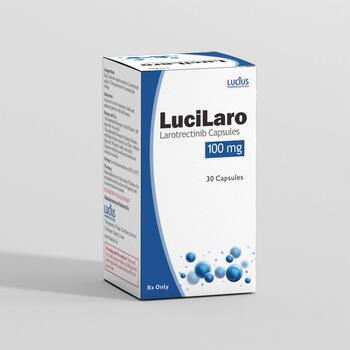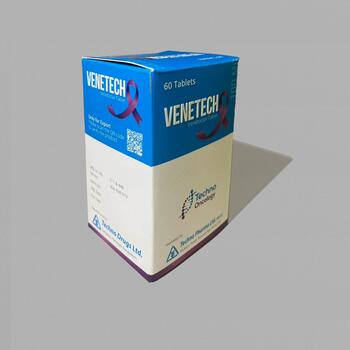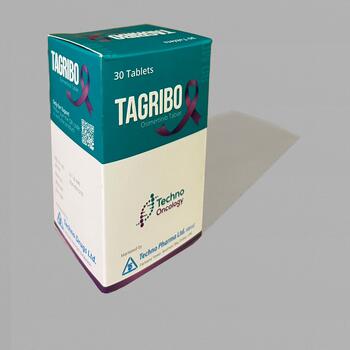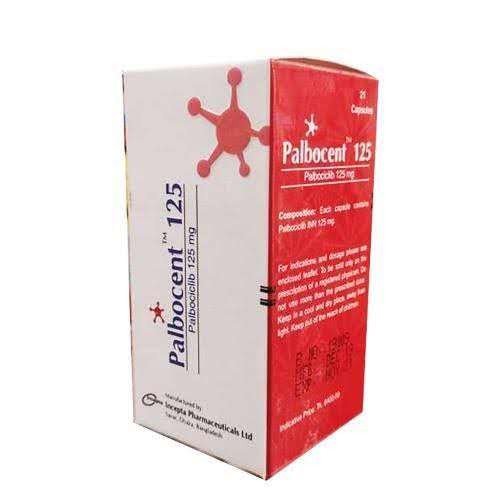拉罗替尼 (Larotrectinib)100mg

1. Composition:
- Larotrectinib: An oral targeted therapy specifically designed to treat solid tumors harboring NTRK (neurotrophic receptor tyrosine kinase) gene fusions. NTRK gene fusion is a rare genetic alteration that can lead to the growth and spread of cancer cells, and Larotrectinib can inhibit the abnormal signaling caused by this mutation.
2. Indications:
Larotrectinib is approved for the treatment of adult and pediatric patients with solid tumors carrying NTRK gene fusions, irrespective of the specific type and location of the tumor, including:
- Lung cancer
- Thyroid cancer
- Soft tissue sarcomas
- Gastrointestinal cancers
- Pediatric tumors such as infantile fibrosarcoma
3. Dosage and Administration:
- Administration: Larotrectinib is available as an oral capsule or solution, typically prescribed at a standard dosage of twice daily. The dosage for children and adults may be adjusted based on body surface area or weight.
- Dosage: The recommended dose for adults is 100 mg taken twice daily. The pediatric dosage is usually 100 mg/m² taken twice daily. Dosages should be adjusted based on the patient’s treatment response, adverse effects, and tolerance.
- Treatment Duration: Patients should continue using Larotrectinib until they experience intolerable toxicity or disease progression.
4. Research and Development History:
- Development Background: Larotrectinib was developed by Loxo Oncology and is the first targeted therapy approved globally for solid tumors with NTRK gene fusions. Although NTRK gene fusions are present in various solid tumors, their occurrence is relatively rare. The development of this drug is based on the advancements in precision medicine, utilizing genetic testing to identify these rare mutations and thus achieve more effective targeted treatment.
- Approval and Market Launch: In 2018, Larotrectinib received accelerated approval from the U.S. FDA for the treatment of adult and pediatric patients with solid tumors harboring NTRK gene fusions. This “tissue-agnostic” therapeutic strategy is considered a significant milestone in precision medicine, emphasizing the importance of genetic mutations in cancer treatment rather than traditional therapies based on tumor location.
5. Mechanism of Action:
Larotrectinib works by inhibiting the TRK signaling pathway (the protein encoded by the NTRK gene), blocking the growth signals of cancer cells triggered by NTRK gene fusions. This inhibition effectively curtails tumor growth, regardless of the tumor's location in the body, demonstrating a “tissue-agnostic” efficacy characteristic; that is, the drug targets specific genetic mutations rather than relying on the tumor's anatomical site.
6. Summary:
Larotrectinib is a targeted anti-cancer drug for NTRK gene fusions, suitable for all patients with solid tumors carrying this genetic mutation, regardless of the tumor's primary site. By inhibiting TRK protein signaling, it prevents tumor growth and spread. Although the drug generally has good tolerability, it may cause adverse effects such as fatigue, gastrointestinal reactions, and liver function abnormalities; thus, patients should regularly monitor relevant health indicators during treatment. The development and approval of Larotrectinib mark a significant advancement in precision medicine in cancer treatment, especially with its “tissue-agnostic” therapeutic strategy, helping many patients with rare mutations receive effective treatment.







